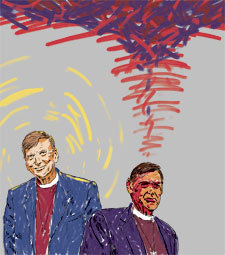Questions about the "historical Jesus' are back with a vengeance. Just think of the last twelve months. First, there was the National Geographic documentary extravaganza about the unearthing of the Gospel of Judas. Not to be outdone, the Discovery Channel aired its own multi-million dollar TV special on the "discovery' of Jesus' family tomb in Talpiot, Jerusalem, complete with DNA samples. Jeffrey Archer and biblical scholar Francis Moloney then published their Gospel According to Judas, an imaginative retelling of the Jesus story from the viewpoint of the Judas.
And, now, John Shelby Spong releases his Jesus for the Non-Religious, a full-scale explanation of his long held view that all of the major details of the Gospel-narrative "” Jesus' birth in Bethlehem, the names of his parents, the healings, the Twelve apostles, the trial and crucifixion scenes and, of course, the resurrection "” are fictional additions to an undoubtedly powerful life.
 As the early Jewish-Christians took part in their synagogue festivals throughout the year, Spong tells us, they "remembered' stories about Jesus that would resonate with the major celebrations of the Jewish calendar. Thinking of Jesus at Passover time, for example, prompted the fashioning of the Passion narrative. Thinking of him on the Day of Atonement produced stories of his cleansing the lepers and forgiving the sinners. And on the story goes.
As the early Jewish-Christians took part in their synagogue festivals throughout the year, Spong tells us, they "remembered' stories about Jesus that would resonate with the major celebrations of the Jewish calendar. Thinking of Jesus at Passover time, for example, prompted the fashioning of the Passion narrative. Thinking of him on the Day of Atonement produced stories of his cleansing the lepers and forgiving the sinners. And on the story goes.
There are no surprises here for people who have watched Spong's trajectory over the years. He is boldly attempting to revive in popular circles a theory about the Gospels originally proposed in academic circles in the 1970s-80s (by English scholar Michael Goulder). If Bishop Spong has read the scholarly reviews of the theory he has judged it inexpedient to acknowledge to his readers just how "marginal' these views are in the contemporary study of the historical Jesus.
You can read my full review of Jesus for the Non-Religious elsewhere. For now, I want to make a different set of points.
Why is Spong's book "” along with other recent sensational claims "” likely to gain traction with our friends and family? Part of the answer is undoubtedly: human sinfulness. Some people are just looking for an escape route out of the claims of Christ. But I think it would be lazy to leave it there. I want to suggest two other (related) factors that might not be so easy to hear.
I have said before that I think many of us have let our historical guard down. While we were busy talking about the rise of Post Modernism and the demise of the public's questions about "fact' and "truth', the study of the historical Jesus in academic circles has been growing at an incredible rate. Much of this scholarly work is sound and not at all unfriendly to a traditional portrait of Jesus. Some of it, however, is highly sceptical and it is this stuff that is starting to trickle down into popular literature and steal the headlines. I predict it will continue to do so for many years (the Jesus-studies industry is huge). The point is: historical questions about the Gospels "” apparent discrepancies, the authors' use of sources, the question of authorship, the significance of non-canonical Gospels, etc. "” are back with a new sophistication. And they will be back to bite us if we are not "prepared to give an answer" (1 Pet 3:15). A similar phenomenon can be seen in the re-emergence of scientific atheism (another theme that was meant to have passed away with Modernism).
There is a second factor that allows marginal scholarly opinions like Spong's to gain a hearing in our society and even in our churches. I wonder if part of the attraction of this highly sceptical material on Jesus is that it is more sophisticated than the diet frequently on offer in our sermons, bible studies, Christian books and articles. For all its faults and blind-spots, Spong's vision of Jesus and the Gospels is sophisticated: Jesus appears as one firmly rooted in his first century Jewish context, the Gospel writers are rightly credited with artistic brilliance, and relevant literary and historical parallels are brought in to illuminate the text. By comparison, some of our own thinking and talking about Jesus sounds like Sunday School material in grown-up words.
I am not advocating an "historical' approach to preaching, as opposed to a "theological' one (exegesis and biblical theology must remain primary). Nor am I suggesting that our sermons and Bible studies should become more technical or intellectual. I am just saying that it is time to read, study and preach the Gospels with depth "” with due attention to solid historical background, with an eye to the literary elegance of the texts, with an honest discussion of the apparent discrepancies between the Gospels and, most of all, with a passion for revealing Jesus in all his compelling, surprising, credible beauty. Then, as we are confronted with the marginal stuff coming from Spong and others, we will not be blinded by pseudo-science; rather, we will be able to take (or leave) the arguments on their merits. Four recommendations, then, to get us started: Mark Allan Powell's Jesus as a Figure of History, N. T. Wright's The Challenge of Jesus, Graham Stanton's The Gospels and Jesus and Paul Barnett's Jesus and the Logic of History.



















